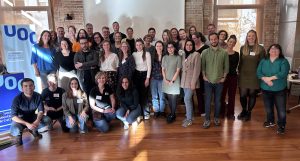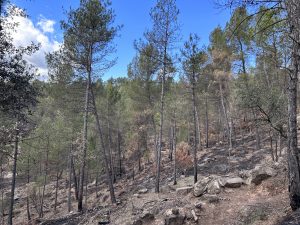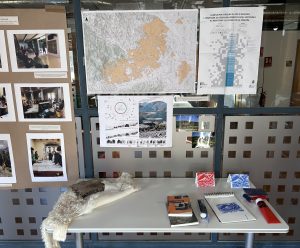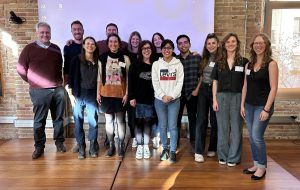Written by Lucía de la Riva
The “PyroLife 2023 Conference: The four axes of diversity of wildfire” (interdisciplinarity, intersectorality, geography, and gender) took place from the 14th to the 16th of March at Can Jaumandreu, the premises of the Open University of Catalonia (UOC) in Barcelona, Spain. The Pau Costa Foundation (PCF), the UOC, and Wageningen University & Research (WUR) organised this event aiming to present the novel results obtained by the PyroLife Early Stage Researchers (ESRs), discuss the present and future of Integrated Fire Management (IFM), and give opportunities to the participants to expand their professional network. A total of 16 countries were represented at the event, including 11 European countries, the UK, Canada, the USA, and New Zealand.

Group photo of the PyroLife 2023 Conference (source: PCF).
The programme included a field trip on the first day and two days of presentations, panel discussions, a workshop, an exhibition, and a poster session.
The field trip took place alongside the European project FIRE-RES and was organised by the Catalan Fire and Rescue Service (CFRS), the Forest Science and Technology Centre of Catalonia (CTFC), and the PCF. Participants visited the 2022 Pont de Vilomara Wildfire, 70 km north from Barcelona. The visit allowed insightful understanding on the fire behaviour, the response strategy implemented during that fire, and the impact of such fire at a landscape scale. The second stop and last stop was at Cal Riera, a privately-owned forested land managed by the CFRS. Participants met the owner, Jaume Cunill, and learned about the history of the property, the vegetation structure present, and the Prescribed Burning Programme implemented by CFRS to reduce the risk of fire.


Top: first stop on the field trip: El Pont de Vilomara, where a high-intensity fire occurred in 2022. Bottom: second stop: Cal Riera, a forested land privately owned and managed by the Catalan Fire and Rescue Service (source: PCF).
The conference meant a special point in the project where, after a very rough start due to the COVID pandemic, “we could meet in person and look back at the past three years and look forward to where will go from here”, said the scientific director of PyroLife Dr. Cathelijne Stoof. The programme was designed to reflect core elements of the Marie Skłodowska–Curie Innovative Training Networks: bringing people together and education, and to put ESRs in the spotlights. They were the centre of attention of the presentations and panel discussions, which made the event distinctive.
IFM is both needed, to adapt to changing fire regimes, and complex, as it involves a wide range of stakeholders working together. The results presented by PyroLife ESRs gave insights into how this can be understood and achieved. Besides presenting their research, they participated in fruitful panel discussions. They contributed to the understanding of wildfires in Northern and Southern Europe, their economic impact, the nature and needs of wildland-urban interfaces around the globe, building design, resilience, the role of local communities, lessons that can be taken from flood management, governance, and interagency exchange.
“The conference was the first time during the project that the research being produced by the ESRs’ projects is being shared and discussed. It was a fantastic opportunity to see novel fire research in different topics interconnecting between them and being so cross-sectoral”, stated Dr. Núria Prat, member of the Executive Board.
Besides their presentations, PyroLife ESRs shared with the conferees moments that have been meaningful during their research through an exhibition. They displayed pictures, artwork, maps, data, books, tools, and a piece of leather, allowing participants to know them and their work better from an original and more personal perspective.

A sample of the items displayed in the exhibition (source: PCF).
Keynote speakers Claire Smyth (South Eastern Health & Social Care Trust) and Mark Smyth (Northern Ireland Fire & Rescue Service, NIFRS) gave an inspirational presentation on “collective leadership”, an approach where “everyone takes responsibility for the success of the organisation as a whole” instead of just the leaders. They explained how a collective leadership strategy was designed for Health and Social Care in Northern Ireland and put into practice in the NIFRS, which could potentially be transferred to teams researching and implementing IFM across Europe.
The third keynote speaker was Marc Castellnou (CFRS). He provided a very valuable practitioner’s perspective from more than 20 years of experience leading the GRAF teams. His presentation advanced by posing questions to the audience that sparked lively discussions where science and practice met. A message to take home was that science has a very important role to help firefighters by providing results that help understand the wildfire scenario of the future (already here).
Invited guest Dr. Conceição Colaço (ISA, University of Lisbon) and Cathelijne Stoof facilitated a final workshop on future education and research with the goals of identifying the knowledge, skills, and competencies that the next generation of fire researchers and experts need.
Discussions continued in the poster session, where a variety of projects and research were presented. See the posters here.
Two remarkable moments were the welcome to Can Jaumandreu by David Megías Jiménez, Director of the UOC Internet Interdisciplinary Institute (IN3), and to the event by Project Officer Apostolos Paralikas, who joined the conference from the European Commission offices in Belgium.

PyroLife ESRs with Project Officer Apostolos Paralikas (source: PCF).
The participants ended the PyroLife conference with a bittersweet feeling. The event was a fantastic gathering to discuss and reflect on the results of PyroLife, it was also a very friendly space to network and make long-lasting connections. However, the conference also meant that PyroLife is getting to an end, after a very intense journey of learning together, and the conference was, for most of them, a farewell.
They all went home with a very positive feeling that PyroLife has laid the foundations for a new generation of fire researchers on IFM. So, if you are searching for well-trained professionals, be aware that the ESRs are finishing their PhDs and will be entering the job market soon!


Leave a Reply